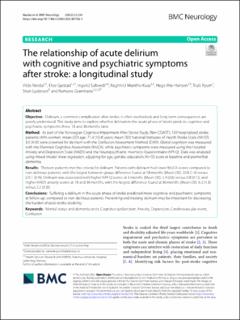The relationship of acute delirium with cognitive and psychiatric symptoms after stroke: a longitudinal study
| dc.contributor.author | Nerdal, Vilde Kristine | |
| dc.contributor.author | Gjestad, Elise Ødegård | |
| dc.contributor.author | Saltvedt, Ingvild | |
| dc.contributor.author | Munthe-Kaas, Ragnhild | |
| dc.contributor.author | Ihle-Hansen, Hege | |
| dc.contributor.author | Ryum, Truls | |
| dc.contributor.author | Lydersen, Stian | |
| dc.contributor.author | Grambaite, Ramune | |
| dc.date.accessioned | 2023-02-02T08:45:51Z | |
| dc.date.available | 2023-02-02T08:45:51Z | |
| dc.date.created | 2022-06-28T14:16:56Z | |
| dc.date.issued | 2022 | |
| dc.identifier.citation | BMC Neurology. 2022, 22 (1), . | en_US |
| dc.identifier.issn | 1471-2377 | |
| dc.identifier.uri | https://hdl.handle.net/11250/3047886 | |
| dc.description.abstract | Objective Delirium, a common complication after stroke, is often overlooked, and long-term consequences are poorly understood. This study aims to explore whether delirium in the acute phase of stroke predicts cognitive and psychiatric symptoms three, 18 and 36 months later. Method As part of the Norwegian Cognitive Impairment After Stroke Study (Nor-COAST), 139 hospitalized stroke patients (49% women, mean (SD) age: 71.4 (13.4) years; mean (SD) National Institutes of Health Stroke Scale (NIHSS) 3.0 (4.0)) were screened for delirium with the Confusion Assessment Method (CAM). Global cognition was measured with the Montreal Cognitive Assessment (MoCA), while psychiatric symptoms were measured using the Hospital Anxiety and Depression Scale (HADS) and the Neuropsychiatric Inventory-Questionnaire (NPI-Q). Data was analyzed using mixed-model linear regression, adjusting for age, gender, education, NIHSS score at baseline and premorbid dementia. Results Thirteen patients met the criteria for delirium. Patients with delirium had lower MoCA scores compared to non-delirious patients, with the largest between-group difference found at 18 months (Mean (SE): 20.8 (1.4) versus (25.1 (0.4)). Delirium was associated with higher NPI-Q scores at 3 months (Mean (SE): 2.4 (0.6) versus 0.8 (0.1)), and higher HADS anxiety scores at 18 and 36 months, with the largest difference found at 36 months (Mean (SE): 6.2 (1.3) versus 2.2 (0.3)). Conclusions Suffering a delirium in the acute phase of stroke predicted more cognitive and psychiatric symptoms at follow-up, compared to non-delirious patients. Preventing and treating delirium may be important for decreasing the burden of post-stroke disability. | en_US |
| dc.language.iso | eng | en_US |
| dc.publisher | BMC | en_US |
| dc.rights | Navngivelse 4.0 Internasjonal | * |
| dc.rights.uri | http://creativecommons.org/licenses/by/4.0/deed.no | * |
| dc.title | The relationship of acute delirium with cognitive and psychiatric symptoms after stroke: a longitudinal study | en_US |
| dc.title.alternative | The relationship of acute delirium with cognitive and psychiatric symptoms after stroke: a longitudinal study | en_US |
| dc.type | Peer reviewed | en_US |
| dc.type | Journal article | en_US |
| dc.description.version | publishedVersion | en_US |
| dc.source.pagenumber | 12 | en_US |
| dc.source.volume | 22 | en_US |
| dc.source.journal | BMC Neurology | en_US |
| dc.source.issue | 1 | en_US |
| dc.identifier.doi | 10.1186/s12883-022-02756-5 | |
| dc.identifier.cristin | 2035825 | |
| cristin.ispublished | true | |
| cristin.fulltext | original | |
| cristin.qualitycode | 1 |
Tilhørende fil(er)
Denne innførselen finnes i følgende samling(er)
-
Institutt for nevromedisin og bevegelsesvitenskap [3102]
-
Institutt for psykologi [2893]
-
Publikasjoner fra CRIStin - NTNU [37289]
-
St. Olavs hospital [2444]

